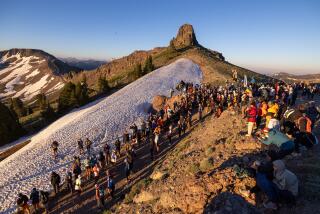For Teams, Funding Is First Hurdle
In order to finish anything, one must begin. In order to begin the Eco-Challenge, one must have about $8,000 to spend on preparation and registration.
And in the case of Bill and Louise Lovelace, a couple from West Hills, double the cash necessary to reach Utah, site of the April, 1995, expedition competition that will require the use of canoes, mountain bikes, white-water rafts, horses and climbing ropes.
âWith both of us on the team, itâs quite a financial drain on our family,â Bill said.
Eco-Challenge does not stand for Economic Challenge, but it might as well for the Lovelaces and three teammates. They have tried various fund-raising strategies for several months without much success.
âPeople applaud what we are doing; they wish us luck but no one will sponsor us,â said Louise, a special education teacher. âWeâve tried with large companies and smaller community-related companies. I donât know if itâs a sign of the times or if itâs just that people are not familiar with (the Eco-Challenge), but our attempts have been futile.â
Aside from a garage sale that netted $400 and two companies that will provide equipment at cost, the Lovelaces are on their own.
They might as well get used to it, because there will be no one to lean on during the inaugural Eco-Challenge, an ambitious, arduous endeavor patterned after the European event Raid Gauloises.
None of the 50 five-member teams--each team must have a female member--will know details of the course until 24 hours before the race begins.
However, they do know all too well the equipment required to complete the 300-mile journey, which will take 7-10 days.
âThe list is endless,â said Bill Lovelace, an insurance company executive.
A helmet and a harness, a stove and a shovel, boots and blades, four different kinds of packs, three kinds of gloves, two kinds of jackets, and one of about 50 other items. Try and ask Santa for that.
Compared to fund-raising, training is a breeze for the Lovelaces. At least they are on familiar ground during their weekly regimen of running 60 miles and bicycling 150 miles.
Bill Lovelace, 47, is the team leader for rafting and Louise, 41, is the team leader for first aid. Both have completed the Ironman triathlon eight times. Bill has run in 118 marathons and Louise has run in 56.
Their teammates have expertise in a variety of areas. Doug Wilde, 40, is an expert in canyoneering and horseback riding. Kirk Boylsteon, 37, specializes in mountaineering, rappelling and canoeing. Duane McDowell, 35, is best at bicycling and climbing.
The team has been canoeing at Marina Del Rey, mountain climbing in the Angeles National Forest and horseback riding at Hughes Lake.
Less predictable is the psychological toll the race will take. Race organizers like it that way. âWeâre trying to make this equally brains and brawn,â said Mark Burnett, a Topanga resident who founded the Eco-Challenge.
âThere will be a lot of intelligence needed, a lot of cryptic stuff, misleading clues and things youâve got to think through. Things will not always be as they seem, just like real life.â
Cryptic comments to be sure. Certain things are spelled out, however. The race will be divided into five segments:
* Ride and run. Each team will have three horses. Two riders on one horse is prohibited, so two competitors will take turns running alongside the three riders.
* Mountaineering. Utahâs breathtaking sheer cliffs must be crossed with rappel, ropes, Tyrolean bridges and harnesses.
* Canoeing and white-water rafting. Two canoes and one raft are provided for each team.
* Mountain biking. Each team member must ride--and at times carry--a bike across rough terrain.
* Canyoneering. Teams must travel through deep, wet canyons, often swimming while pushing their packs ahead. Watch out for those flash floods!
There will be frequent checkpoints. If one member of a team quits, the entire team is disqualified. First prize is $10,000 and free entry for the competition in 1996, which will be held in a different state.
Burnett, along with a small group of colleagues, plans to expand the Eco-Challenge at a rapid rate, holding at least one every year. The top team from each of six national regions in the Utah competition will compete two months later in a week-long Eco-Challenge in the woods of Maine and the coast of Massachusetts.
The Utah race will be featured in an MTV special and on NBC Dateline.
âThis will create a new type of star,â Burnett said. âThe top competitors will be well-known and Eco-Challenge will become a word as recognizable as triathlon.â
Meanwhile, back in the trenches, the Lovelaces just want someone to pony up cash for the expenses.
âGetting sponsorship is part of the experience, part of the challenge,â Burnett said. âGet to the starting line with all five people, and you have completed the first part of the Eco-Challenge.â
More to Read
Sign up for The Wild
Weâll help you find the best places to hike, bike and run, as well as the perfect silent spots for meditation and yoga.
You may occasionally receive promotional content from the Los Angeles Times.







